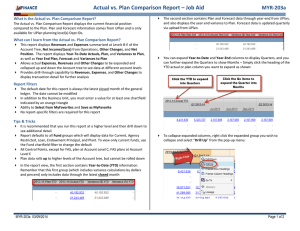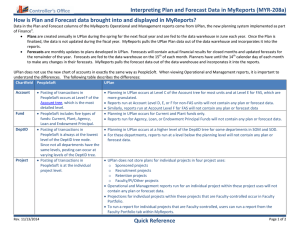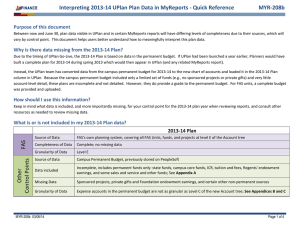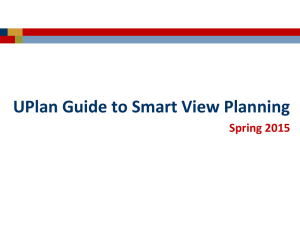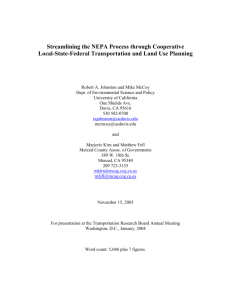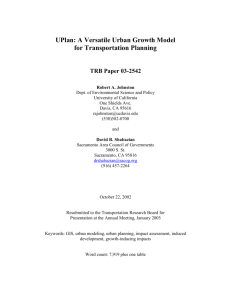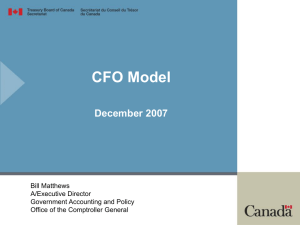Surviving large scale rollout of Financial System overhaul
advertisement
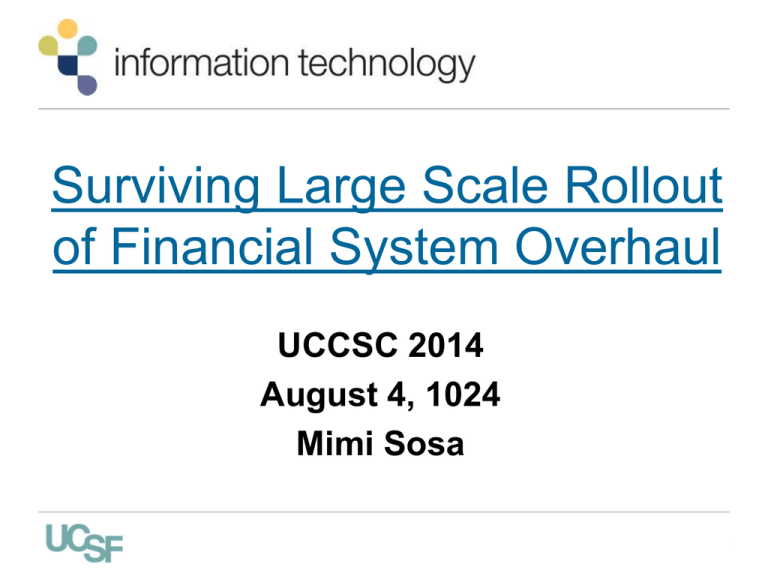
Surviving Large Scale Rollout of Financial System Overhaul UCCSC 2014 August 4, 1024 Mimi Sosa Where we were Once upon a time, long long ago…. Financial accounting structure was implemented in Mainframe system once considered “leading edge” Where we were Over next decade(s); Accounting structure had planted a deep roots across all over campus and Medical Center departments Where we were Few years ago, we had to face the truth and begin the process to bring the system into 21st century… Where we wanted to go New Chart of Accounts (COA) A comprehensive redesign of UCSF’s system of accounting records MyReports Improved financial and operational reporting campus-wide to support decision making UPlan Web-based Budgeting and planning tool with Excel-style interface Pre Planning Part of Chancellor’s Goals Create a financially sustainable enterprise-wide business model Design and implement transparent and effective budgeting and planning processes Maximize existing revenue streams, develop new ones and continue Operational Excellence efforts to manage costs High Level Conceptual Design of COA Road Show by Controller’s Office High Level time/effort estimates Identify key players Planning Establish Project Teams Project Management Team Departmental Champions Steering Committee/Think Tank Working Groups (SME) Technical Teams Establish Roles and Responsibilities High Level Project Timeline Project Plan, Project Budget & Resource Plan Comprehensive inventory of Departmental Systems System Environment Planning Communication Strategy Design & Development Conversion Methodology & Development Identify impacted programs Meetings with Departmental Representatives and IT staff Identify Integration impact Functional Specifications Technical Specifications and Development Testing System Environment Management Test Case/Scenarios Functional Testing Integration Testing Performance Testing User Acceptance Testing Mock Conversions Tracking Testing Issues Implementation Preparations Downtime for all impacted systems and dependencies Implementation (Cutover)Plan (Including Rollback Plan) Implementation Rehearsals Training Change Management Pre-Cutover Tasks COMMUNICATIONS!!!! Implementation 24x7 Operation Check-in points Implementation staff – Task updates Functional Sanity Testing Go/No Go Challenges • • • • • • • Design Changes SaaS modifications & Integrations Lack of Departmental system inventory Lack of Design/Conversion understanding Moving System freeze dates Coordination of 3 major initiatives Coordination and communication with all impacted systems TIPS Identify Key User Departments and advocates early Identify right resources with proper skill sets Run the Project with Internal Staff with augmentation of consultants as required Manage by Project Plan Commitment from Senior Management to Staff TIPS Take the opportunity to re-engineer business process and implement best practice Clear understanding of business requirements Thorough analysis of current state Minimize customizations Define historical data conversion requirements early and understand various dependencies Thoughtful decision on go live date Timely decision on key design issues TIPS Identify all integration points and it’s dependencies Identify all impacted systems early Early engagement with SaaS vendors Early engagement with UCOP for UCOP reporting and identify impact to the system Frequent Conversion Testing Multiple “go live” rehearsals Observe system freeze Test, Test and Test TIPS Dedicated Website Change Management & Training Post go live support readiness Leverage all channels of communications Keep positive attitudes & stay flexible Rally the team and support each other Believe that project will be completed (in this lifetime) F3 Stats • 350+ people contributed as Champions, UPlan Control Point Coordinators, FAS Think Tank members, SOM Think Tank members, and MyReports SME’s and Volunteer Testers • 80 total project team members over 2 years • 10,000+ UCSF personnel affected • 5,630 people made 17,008 visits to the F3 Training site • 29 training modules & 69 job aids created • 2,685 people took online training for COA, MyReports, and UPlan • 295 people took in-class UPlan training • 361 pages written to create the UPlan training manual • 23 Champion Meetings totaling 46 hours and 1,230 slides • 8 Town Halls • 1,585 people made 3,177 visits to the Department Readiness tool • 209 readiness items in DR Tool • 8 dedicated distribution lists • 4 dedicated help desk resources COA Stats 300~ Design Specifications written (many rewritten) 1100~ Tickets created for Enhancements and Testing 350~ PeopleSoft Technical Projects Migrated 9500~ PeopleSoft Technical Objects Modified 75,000~ hours spent by 28 Staff (past and present) and Consultants 16~ Monthly Meeting with Department IT Project Timeline – Approx. 2 years Post GO LIVE Almost scary quiet All hands on deck to quickly resolve issues Continued few strategic meetings to ensure smooth transition Vigilant monitoring of the system Tracked trending of issues to identify improvement areas CELEBRATE!!!
